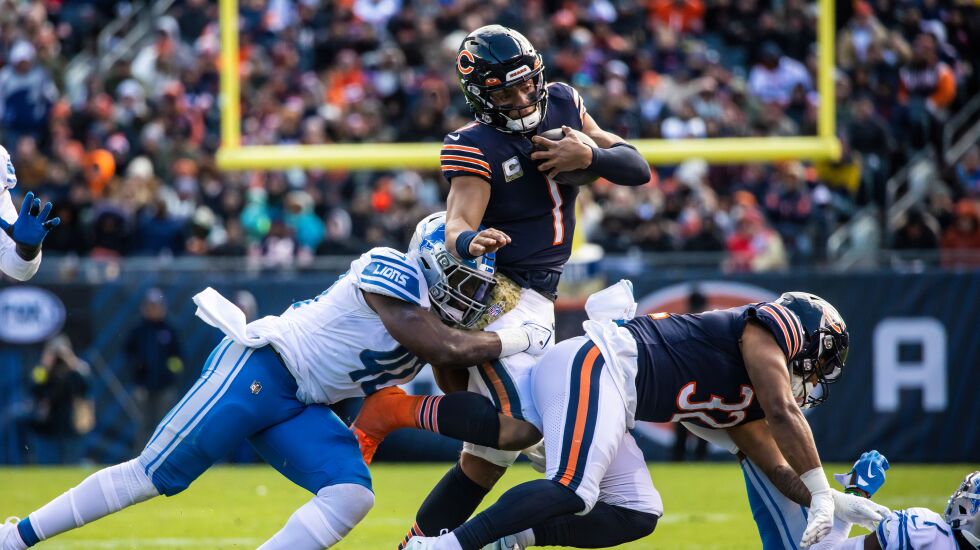
Justin Fields still has a lot to prove as a passer, but he has established one element indisputably: He’s the best running quarterback in the NFL.
Raise your hand if you thought you’d never see that on the Bears.
It’s an overwhelming weapon, and that alone is grounds for hope that Fields is the long-awaited franchise quarterback. He’s bringing a superpower to the line of scrimmage every play, and no matter what defenses do to negate that, he’s good enough to overcome it.
Regardless of whether he improves as a passer, and there are indications he’s getting better, he’ll always have that. That’s enough to build around if you have a general manager and coach willing to adapt. Matt Eberflus and offensive coordinator Luke Getsy saw the light four games into the season and did so.
There’s no longer any resistance at Halas Hall to letting Fields do his thing, and finally free of that hindrance, he has been electric.
Over his last six games, Fields has put up an average of 270 yards passing and rushing combined. He has produced 15 touchdowns. He has picked up 11.7 yards per carry. His passer rating is 99.6. He isn’t why they’re losing.
And his running ability isn’t going away.
Fields leads all quarterbacks in yards rushing (749, which is seventh overall), rushing touchdowns (six) and rushing first downs (48). His 7.2 yards per carry is a hair behind Lamar Jackson, the gold standard of dual-threats, at 7.4.
It takes a microscope to decide which of them is the better runner, but Fields gets the edge by combining Jackson’s agility with speed reminiscent of Michael Vick’s. He clocked the top speed by a quarterback at 21.2 miles per hour on a run against the Cowboys, and has exceeded 20 miles per hour seven times.
There are a bunch of good running quarterbacks — Josh Allen, Kyler Murray, Jalen Hurts, Daniel Jones — but Fields and Jackson are on their own level.
Fields looks like Vick when he glides and weaves into the second level of a defense, as he did on a 67-yard breakaway Sunday against the Lions. He looks like Jackson when he slips defenders in the backfield to turn losses into gains, as he did when avoiding an eight-yard sack and running a total of 34 actual yards for a one-yard touchdown Sunday.
It is with great caution that anyone compares a quarterback’s running ability to Vick and Jackson. But Fields has joined the club.
Isn’t it a marvel, by the way, that defensive backs who are 20 yards farther down the field have so much trouble getting to him? He’s so fast that by the time they realize what’s happening, it’s too late.
“He’s got tremendous speed and he’s very strong,” Eberflus explained. “He steps on guys pretty fast. He doesn’t do a lot of wiggling once he gets into that defensive backfield; He puts on the gas.
“I don’t know if there’s anybody really like him in terms of the strength and the speed. He just breaks down angles really fast.”
That’s essential to Fields’ style and success. If he ramps up his passing production, he’ll be an absolute star.
The only concern, and it’s a significant one that was presented to Eberflus again Sunday, is injury. There’s always queasiness about a quarterback taking hits, but the Bears just need strong stomachs. They can’t restrict this part of his game.
It’s not as scary as it seems. Over Vick’s second through sixth seasons, he played 66 of a possible 80 games — most of the time he missed was in 2003 when he broke his leg. From his second season through now, Jackson has played 51 of 58.
It’s worth the risk, especially for a team that’s typically thrill-starved. It took way too long for the Bears to get here, but they finally have a quarterback who does at least one thing better than anybody.







